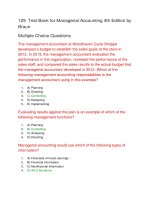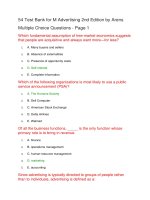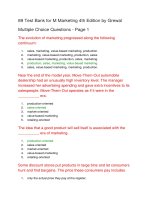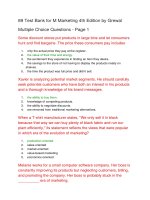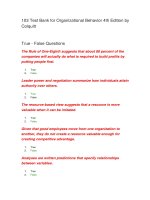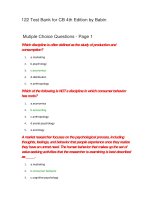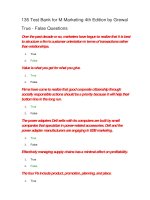Test bank for business ethics 4th edition by hartman
Bạn đang xem bản rút gọn của tài liệu. Xem và tải ngay bản đầy đủ của tài liệu tại đây (528.84 KB, 46 trang )
Test Bank for Business Ethics 4th Edition By Hartman
1. Ethical decision making in business is limited to major corporate decisions with dramatic social
consequences.
True
False
2. In business, every decision can be covered by economic, legal, or company rules and regulations.
True
False
3. Due to the high incidence of corporate frauds today, the direct costs of unethical business practice are less
visible now than they have ever been before.
True
False
4. In a general sense, a business stakeholder is one who has made substantial financial investments in the
business.
True
False
5. A firm's ethical reputation can provide a competitive advantage in the marketplace with customers, suppliers,
and employees.
True
False
6. The Grayson-Himes Pay for Performance Act was passed to amend the executive compensation provisions of
the Emergency Economic Stabilization Act of 2008.
1-1
Copyright © 2017 McGraw-Hill Education. All rights reserved. No reproduction or distribution without the prior written
consent of McGraw-Hill Education.
True
False
7. Ethics refers to how human beings should properly live their lives.
True
False
8. Ethical business leadership is the skill to create a work environment that helps employees guiltlessly embrace
their own good and bad facets.
True
False
9. Norms appeal to certain values that would be promoted or attained by acting in a certain way.
True
False
10. Values are the only guidance individuals need to act in ways that are positive or ethical.
True
False
11. Ethical values are personal codes of ethics that ensure that a person meets his or her individual standards of
well-being.
True
False
12. The well-being promoted by ethical values is not a personal and selfish well-being.
True
False
13. Societies that value individual freedom legally stipulate codes of personal integrity and common decency to
safeguard this freedom.
True
False
14. In civil law, there is no room for ambiguity in applying the law because much of the law is established by
past precedent.
True
False
15. Ethical theories are patterns of thinking, or methodologies, to help us decide what to do.
True
False
Multiple Choice Questions
1-2
Copyright © 2017 McGraw-Hill Education. All rights reserved. No reproduction or distribution without the prior written
consent of McGraw-Hill Education.
16. Identify a true statement about ethical decision making in business.
A. Ethical decision making is not limited to major corporate decisions with dramatic social consequences.
B. Ethical decisions that employees make have to always be based upon clearly established guidelines laid
down by the board of directors.
C. All ethical decisions can be covered by economic, legal, or company rules and regulations.
D. Every instance of ethical decision making should be based on the law of the land.
17. Identify a true statement about ethical decision making in business.
A. Employees only have to deal with situations that call for ethical decision making once they reach managerial
positions within organizations.
B. At some point, every worker will be faced with an issue that will require ethical decision making.
C. Companies are legally obligated to cover all ethical decisions by internal rules and regulations.
D. Ethical decision making should not rely on the personal values and principles of the individuals involved.
18. Which of the following statements is true about ethical decision making in business?
A. Ethical decision making is limited to the type of major corporate decisions with social consequences.
B. Every employee does not face an issue that requires ethical decision making.
C. All ethical decisions can be covered by economic, legal, or company rules and regulations.
D. Ethical decision making should rely on the personal values and principles of the individuals involved.
19. In a general sense, anyone who affects or is affected by decisions made within a firm can be called a
business _____.
A. nominee
B. stakeholder
C. analyst
D. insider
20. Which of the following best describes a business stakeholder?
A. Only the minority shareholders in a business entity
B. Only those who have acquired significant shares in a firm
C. Anyone who audits a firm
D. Anyone who affects or is affected by decisions made within a firm
1-3
Copyright © 2017 McGraw-Hill Education. All rights reserved. No reproduction or distribution without the prior written
consent of McGraw-Hill Education.
21. Identify the bill that was passed in April 2009 to amend the executive compensation provisions of the
Emergency Economic Stabilization Act of 2008 to prohibit unreasonable and excessive compensation and
compensation not based on performance standards.
A. The Gramm-Rudman-Hollings Performance and Results Act
B. The Employee Pay Comparability Act
C. The Grayson-Himes Pay for Performance Act
D. The Statutory Pay-As-You-Go Act
22. Which of the following is a power granted to the Treasury secretary of the United States under the GraysonHimes Pay for Performance Act?
A. Specifying which employees are eligible to be paid bonuses
B. Reviewing how companies give their bonuses
C. Reviewing the constitution of the boards of directors of companies
D. Specifying what criteria must be considered when elevating people to upper-management positions
23. Which of the following best describes ethics?
A. An academic discipline that originated in the early 1900s
B. A descriptive approach that provides an account of how and why people do act the way they do
C. The study of how human beings should properly live their lives
D. A descriptive approach such as psychology and sociology
24. Which of the following is an approach advocated while teaching ethics?
A. Teachers should teach ethical dogma to a passive audience.
B. Teachers should consider acceptance of customary norms as an adequate ethical perspective.
C. Teachers should understand that their role is only to tell the right answers to their students.
D. Teachers should challenge students to think for themselves.
25. Philosophers often state that ethics is _____, which means that it focuses on people's reasoning about how
they should act.
A. normative
B. derivative
C. circumstantial
D. clinical
1-4
Copyright © 2017 McGraw-Hill Education. All rights reserved. No reproduction or distribution without the prior written
consent of McGraw-Hill Education.
26. Which of the following observations is true of ethics?
A. It is descriptive in nature.
B. It deals with our reasoning about how we should act.
C. It provides an account of how and why people act the way they do.
D. It is equivalent to law-abiding behavior.
27. Social sciences such as psychology and sociology are different from ethics owing to the fact that they are
_____.
A. normative in nature
B. descriptive in nature
C. conjectural in nature
D. clinical in nature
28. _____ seeks an account of the how and why people should act a certain way, rather than how they do act.
A. Sociology
B. Psychology
C. Ethics
D. Anthropology
29. Which of the following is a factor that distinguishes social sciences, such as psychology and sociology, from
ethics?
A. Unlike ethics, these disciplines inquire why people act the way they do.
B. Unlike ethics, these disciplines are normative rather than descriptive.
C. Unlike ethics, these disciplines provide an account of how people should act.
D. Unlike ethics, these disciplines give directives about how people should act.
30. The _____ discipline provides an account of how and why people do act the way they do.
A. descriptive
B. supererogatory
C. normative
D. stipulative
1-5
Copyright © 2017 McGraw-Hill Education. All rights reserved. No reproduction or distribution without the prior written
consent of McGraw-Hill Education.
31. Individual codes of conduct based on one's value structures regarding how one should live, how one should
act, what one should do, and what kind of a person should one be is sometimes referred to as _____.
A. morality
B. independence
C. leadership
D. rationality
32. Morality is the aspect of ethics that we can refer to by the phrase "_____."
A. personal freedom
B. individual rationality
C. personal integrity
D. persuasive rationality
33. Ethics refers to the applications of _____ on which people's decisions are based.
A. values
B. morals
C. etiquettes
D. norms
34. Identify the area of ethics that raises questions about justice, law, civic virtues, and political philosophy.
A. Stipulative ethics
B. Existential ethics
C. Virtue ethics
D. Social ethics
35. The aspect of business ethics that examines business institutions from a social rather than an individual
perspective is referred to as:
A. decision making for social responsibility.
B. corporate cultural responsibility.
C. organizational ethical responsibility.
D. institutional morality.
1-6
Copyright © 2017 McGraw-Hill Education. All rights reserved. No reproduction or distribution without the prior written
consent of McGraw-Hill Education.
36. _____ establish the guidelines or standards for determining what one should do, how one should act, what
type of person one should be.
A. Roles
B. Attitudes
C. Norms
D. Laws
37. Which of the following is a true statement about norms?
A. They are underlying beliefs that cause people to choose one way or another.
B. They are standards of appropriate and proper behavior.
C. They provide benchmarks of desirable societal conditions.
D. They consist of guidelines for bringing about positive behavioral change.
38. The crux of normative ethics is that these disciplines:
A. presuppose some underlying values.
B. describe what people do.
C. should always involve the study or discipline of ethics.
D. branch away from social ethics to personal ethics.
39. Which of the following refers to an underlying belief that causes people to choose between plausible courses
of action?
A. Norms
B. Paradigms
C. Protocols
D. Values
40. Which of the following is true about values?
A. Values are the highest standards of appropriate and proper behavior.
B. Corporate scandals prove the fact that individuals have personal values, but institutions lack values.
C. Values cannot lead to unethical results.
D. Values are underlying beliefs that cause us to act or to decide in a certain way.
1-7
Copyright © 2017 McGraw-Hill Education. All rights reserved. No reproduction or distribution without the prior written
consent of McGraw-Hill Education.
41. _____ are beliefs and principles that provide the ultimate guide to a company's decision making?
A. Mission statements
B. Core values
C. Historical milestones
D. Vision statements
42. Which of the following is a way of saying that a corporation has a set of identifiable values that establish the
expectations for what is normal within the firm?
A. Organizational culture
B. Organizational policy
C. Organizational code
D. Organizational structure
43. Ethics requires that the promotion of human welfare be done:
A. based on the personal opinions of the decision maker.
B. based on the level of need of the beneficiaries.
C. understanding the religious beliefs of the beneficiary.
D. in a manner that is acceptable and reasonable from all relevant points of view.
44. Dramatic examples of tyrannical regimes in history demonstrate that:
A. societies valuing freedom welcome laws that require more than the ethical minimum.
B. just societies can only be achieved through strict enforcement of ethical codes.
C. obedience to the law almost always makes people apathetic towards their ethical duties.
D. one's ethical responsibility may run counter to the law.
45. Telling organizations that their ethical responsibilities end with obedience to the law:
A. is just inviting more legal regulation.
B. is enough to maintain an ethical business environment.
C. reduces the frequency of corporate scandals.
D. eliminates ambiguity while making personal ethics-related decisions.
1-8
Copyright © 2017 McGraw-Hill Education. All rights reserved. No reproduction or distribution without the prior written
consent of McGraw-Hill Education.
46. The failure of personal ethics among companies like Enron and WorldCom led to the creation of the:
A. Brooks Act.
B. Gramm-Leach-Bliley Act.
C. Clinger-Cohen Act.
D. Sarbanes-Oxley Act.
47. Which of the following observations is true?
A. Obedience to the law is sufficient to fulfill one's ethical duties.
B. The law is very effective at promoting "goods."
C. The law cannot anticipate every new dilemma that businesses might face.
D. An individual's ethical responsibility can never run counter to the law.
48. Which of the following is a true statement about the Americans with Disabilities Act (ADA)?
A. What counts as a disability remains ambiguous under the law.
B. The law lays out clear-cut rules for reasonable accommodation.
C. The law has not been put into practice till date.
D. Mental disabilities have been left out of the purview of the law.
49. Practical reasoning is reasoning about:
A. what we should think.
B. what we should do.
C. what we should believe.
D. what we should share.
50. Reasoning about what should be done is known as _____ reasoning.
A. practical
B. objective
C. theoretical
D. predictive
51. Theoretical reasoning is reasoning about:
A. what we actually do.
B. what we should do.
C. what we should believe.
D. what we should implement.
1-9
Copyright © 2017 McGraw-Hill Education. All rights reserved. No reproduction or distribution without the prior written
consent of McGraw-Hill Education.
52. _____ reasoning is reasoning about what we should believe.
A. Practical
B. Abstract
C. Theoretical
D. Descriptive
53. Which of the following is the pursuit of the highest standard for what we should believe?
A. Theoretical reason
B. Notional reason
C. Emotional reason
D. Practical reason
54. Which of the following is the great arbiter of truth according to the tradition of theoretical reason?
A. Religion
B. Customs
C. Science
D. Norms
55. Which of the following can be thought of as the answer to the fundamental questions of theoretical reason?
A. The scientific method
B. The practical approach
C. The contingency approach
D. The normative model
Fill in the Blank Questions
56. A _____ is anyone affected, for better or for worse, by the decisions made within a particular firm.
57. In an organizational context, _____ is the skill of creating a circumstance in which good people are able to
do good, and bad people are prevented from doing bad.
58. _____ is the aspect of ethics that is referred to by the phrase "personal integrity."
1-10
Copyright © 2017 McGraw-Hill Education. All rights reserved. No reproduction or distribution without the prior written
consent of McGraw-Hill Education.
59. _____ ethics asks us to simply step back from implicit everyday decisions to examine and evaluate them.
60. To say that ethics is a _____ discipline is to say that it deals with standards of appropriate and proper
behavior
61. Normative disciplines presuppose some underlying _____.
62. Acts and decisions that seek to promote human welfare are based on _____.
63. One way to distinguish the various types of values is in terms of the ends they serve. _____ values serve the
end of beauty.
64. The _____ Act requires employers to make reasonable accommodations for employees with disabilities.
65. _____ reasoning is reasoning about what we should
believe.________________________________________
Essay Questions
66. Explain how ethical decisions are required to be made by every worker in a corporate setting, and how they
have the capacity to influence more than just the decision maker.
67. Explain how the study of ethics was viewed until recently, and what kind of shift in focus has occurred post
the scandals.
68. Describe the advantages associated with ethical decision making.
69. Discuss the hesitation (that may be justified) associated with teaching ethics. Explain briefly how the
authors of this text believe that ethics can be taught constructively in a class.
70. Define ethics. How is it different from social sciences such as psychology and sociology?
71. Differentiate the concepts of morality and social ethics.
72. Why is "ethics" considered a normative discipline?
73. Define values, and discuss the element of corporate culture in detail.
74. Describe the two elements of ethical values.
75. Discuss the impact of maintaining that holding to the law is sufficient to fulfill one's ethical duties, and what
it says about the law itself.
76. Explain the difficulties associated with telling a business that its ethical responsibilities end with obedience
to the law.
1-11
Copyright © 2017 McGraw-Hill Education. All rights reserved. No reproduction or distribution without the prior written
consent of McGraw-Hill Education.
77. Discuss the importance of precedents for most laws concerning business.
78. Define risk assessment.
79. While using the risk assessment model, what might the decision makers include in their assessment before
taking action?
80. Differentiate between practical reason and theoretical reason.
Chapter 01 Ethics and Business Key
True / False Questions
1. Ethical decision making in business is limited to major corporate decisions with dramatic social
consequences.
FALSE
Ethical decision making in business is not at all limited to major corporate decisions with dramatic social
consequences. At some point, every worker, and certainly everyone in a management role, will be faced with an
issue that will require ethical decision making.
AACSB: Ethics
Accessibility: Keyboard Navigation
Blooms: Remember
Difficulty: 1 Easy
Learning Objective: 01-01 Explain why ethics is important in the business environment.
Topic: Introduction: Making the Case for Business Ethics
2. In business, every decision can be covered by economic, legal, or company rules and regulations.
FALSE
At some point, every worker, and certainly everyone in a managerial role, will be faced with an issue that will
require ethical decision making. Not every decision can be covered by economic, legal, or company rules and
regulations.
1-12
Copyright © 2017 McGraw-Hill Education. All rights reserved. No reproduction or distribution without the prior written
consent of McGraw-Hill Education.
AACSB: Ethics
Accessibility: Keyboard Navigation
Blooms: Remember
Difficulty: 1 Easy
Learning Objective: 01-01 Explain why ethics is important in the business environment.
Topic: Introduction: Making the Case for Business Ethics
3. Due to the high incidence of corporate frauds today, the direct costs of unethical business practice are less
visible now than they have ever been before.
FALSE
The direct costs of unethical business practice are more visible today than perhaps they have ever been before.
The first decade of the new millennium has been riddled with highly publicized corporate scandals, the effects
of which did not escape people of any social or income class.
AACSB: Ethics
Accessibility: Keyboard Navigation
Blooms: Remember
Difficulty: 1 Easy
Learning Objective: 01-01 Explain why ethics is important in the business environment.
Topic: Introduction: Making the Case for Business Ethics
4. In a general sense, a business stakeholder is one who has made substantial financial investments in the
business.
FALSE
In a general sense, a business stakeholder will be anyone who affects or is affected by decisions made within the
firm, for better or worse.
AACSB: Ethics
Accessibility: Keyboard Navigation
Blooms: Understand
Difficulty: 2 Medium
Learning Objective: 01-01 Explain why ethics is important in the business environment.
Topic: Introduction: Making the Case for Business Ethics
5. A firm's ethical reputation can provide a competitive advantage in the marketplace with customers, suppliers,
and employees.
TRUE
A firm's ethical reputation can provide a competitive edge in the marketplace with customers, suppliers, and
employees.
1-13
Copyright © 2017 McGraw-Hill Education. All rights reserved. No reproduction or distribution without the prior written
consent of McGraw-Hill Education.
AACSB: Ethics
Accessibility: Keyboard Navigation
Blooms: Understand
Difficulty: 2 Medium
Learning Objective: 01-01 Explain why ethics is important in the business environment.
Topic: Introduction: Making the Case for Business Ethics
6. The Grayson-Himes Pay for Performance Act was passed to amend the executive compensation provisions of
the Emergency Economic Stabilization Act of 2008.
TRUE
The Grayson-Himes Pay for Performance Act was passed "to amend the executive compensation provisions of
the Emergency Economic Stabilization Act of 2008 to prohibit unreasonable and excessive compensation and
compensation not based on performance standards."
AACSB: Ethics
Accessibility: Keyboard Navigation
Blooms: Remember
Difficulty: 1 Easy
Learning Objective: 01-01 Explain why ethics is important in the business environment.
Topic: Introduction: Making the Case for Business Ethics
7. Ethics refers to how human beings should properly live their lives.
TRUE
Ethics refers not only to an academic discipline, but to that arena of human life studied by this academic
discipline, namely, how human beings should properly live their lives.
AACSB: Ethics
Accessibility: Keyboard Navigation
Blooms: Remember
Difficulty: 1 Easy
Learning Objective: 01-02 Explain the nature of business ethics as an academic discipline.
Topic: Business Ethics as Ethical Decision Making
8. Ethical business leadership is the skill to create a work environment that helps employees guiltlessly embrace
their own good and bad facets.
FALSE
Ethical business leadership is the skill to create the circumstances in which good people are able to do good, and
bad people are prevented from doing bad. Business leaders have a responsibility for the business environment
that they create.
1-14
Copyright © 2017 McGraw-Hill Education. All rights reserved. No reproduction or distribution without the prior written
consent of McGraw-Hill Education.
AACSB: Ethics
Accessibility: Keyboard Navigation
Blooms: Remember
Difficulty: 1 Easy
Learning Objective: 01-03 Distinguish the ethics of personal integrity from the ethics of social responsibility.
Topic: Business Ethics as Personal Integrity and Social Responsibility
9. Norms appeal to certain values that would be promoted or attained by acting in a certain way.
TRUE
Norms establish the guidelines or standards for determining what we should do, how we should act, what type
of person we should be. Another way of expressing this point is to say that norms appeal to certain values that
would be promoted or attained by acting in a certain way.
AACSB: Analytical Thinking
Accessibility: Keyboard Navigation
Blooms: Remember
Difficulty: 1 Easy
Learning Objective: 01-04 Distinguish ethical norms and values from other business-related norms and values.
Topic: Business Ethics as Personal Integrity and Social Responsibility
10. Values are the only guidance individuals need to act in ways that are positive or ethical.
FALSE
In general, values are those beliefs that incline us to act or to choose one way rather than another. One important
implication of this guidance, of course, is that an individual's or a corporation's set of values may lead to either
ethical or unethical results.
AACSB: Ethics
Accessibility: Keyboard Navigation
Blooms: Understand
Difficulty: 2 Medium
Learning Objective: 01-04 Distinguish ethical norms and values from other business-related norms and values.
Topic: Business Ethics as Personal Integrity and Social Responsibility
11. Ethical values are personal codes of ethics that ensure that a person meets his or her individual standards of
well-being.
FALSE
It is important to know two elements of ethical values. First, ethical values serve the ends of human well-being.
Second, the well-being promoted by ethical values is not a personal and selfish well-being. Thus, ethical values
are those beliefs and principles that impartially promote human well-being.
1-15
Copyright © 2017 McGraw-Hill Education. All rights reserved. No reproduction or distribution without the prior written
consent of McGraw-Hill Education.
AACSB: Ethics
Accessibility: Keyboard Navigation
Blooms: Understand
Difficulty: 2 Medium
Learning Objective: 01-04 Distinguish ethical norms and values from other business-related norms and values.
Topic: Business Ethics as Personal Integrity and Social Responsibility
12. The well-being promoted by ethical values is not a personal and selfish well-being.
TRUE
It is important to know two elements of ethical values. First, ethical values serve the ends of human well-being.
Second, the well-being promoted by ethical values is not a personal and selfish well-being. Thus, ethical values
are those beliefs and principles that impartially promote human well-being.
AACSB: Analytical Thinking
AACSB: Ethics
Accessibility: Keyboard Navigation
Blooms: Remember
Difficulty: 1 Easy
Learning Objective: 01-04 Distinguish ethical norms and values from other business-related norms and values.
Topic: Business Ethics as Personal Integrity and Social Responsibility
13. Societies that value individual freedom legally stipulate codes of personal integrity and common decency to
safeguard this freedom.
TRUE
Liberal societies that value individual freedom will seek to legally prohibit the most serious ethical harms.
However, they will not legally require acts of charity, common decency, and personal integrity that may
otherwise comprise the social fabric of a developed culture.
AACSB: Ethics
Accessibility: Keyboard Navigation
Blooms: Understand
Difficulty: 2 Medium
Learning Objective: 01-05 Distinguish legal responsibilities from ethical responsibilities.
Topic: Ethics and the Law
1-16
Copyright © 2017 McGraw-Hill Education. All rights reserved. No reproduction or distribution without the prior written
consent of McGraw-Hill Education.
14. In civil law, there is no room for ambiguity in applying the law because much of the law is established by
past precedent.
FALSE
In civil law (as opposed to criminal law), where much of the law is established by past precedent, there is
always room for ambiguity in applying the law.
AACSB: Ethics
Accessibility: Keyboard Navigation
Blooms: Remember
Difficulty: 1 Easy
Learning Objective: 01-06 Explain why ethical responsibilities go beyond legal compliance.
Topic: Ethics and the Law
15. Ethical theories are patterns of thinking, or methodologies, to help us decide what to do.
TRUE
Ethical theories are patterns of thinking, or methodologies, to help us decide what to do.
AACSB: Ethics
Accessibility: Keyboard Navigation
Blooms: Remember
Difficulty: 1 Easy
Learning Objective: 01-07 Describe ethical decision making as a form of practical reasoning.
Topic: Ethics as Practical Reason
Multiple Choice Questions
16. Identify a true statement about ethical decision making in business.
A. Ethical decision making is not limited to major corporate decisions with dramatic social consequences.
B. Ethical decisions that employees make have to always be based upon clearly established guidelines laid
down by the board of directors.
C. All ethical decisions can be covered by economic, legal, or company rules and regulations.
D. Every instance of ethical decision making should be based on the law of the land.
Ethical decision making in business is not limited to major corporate decisions with dramatic social
consequences. At some point, every worker, and certainly everyone in a management role, will be faced with an
issue that will require ethical decision making.
1-17
Copyright © 2017 McGraw-Hill Education. All rights reserved. No reproduction or distribution without the prior written
consent of McGraw-Hill Education.
AACSB: Ethics
Accessibility: Keyboard Navigation
Blooms: Understand
Difficulty: 2 Medium
Learning Objective: 01-01 Explain why ethics is important in the business environment.
Topic: Introduction: Making the Case for Business Ethics
17. Identify a true statement about ethical decision making in business.
A. Employees only have to deal with situations that call for ethical decision making once they reach managerial
positions within organizations.
B. At some point, every worker will be faced with an issue that will require ethical decision making.
C. Companies are legally obligated to cover all ethical decisions by internal rules and regulations.
D. Ethical decision making should not rely on the personal values and principles of the individuals involved.
At some point, every worker, and certainly everyone in a management role, will be faced with an issue that will
require ethical decision making. Not every decision can be covered by economic, legal, or company rules and
regulations.
AACSB: Ethics
Accessibility: Keyboard Navigation
Blooms: Understand
Difficulty: 2 Medium
Learning Objective: 01-01 Explain why ethics is important in the business environment.
Topic: Introduction: Making the Case for Business Ethics
18. Which of the following statements is true about ethical decision making in business?
A. Ethical decision making is limited to the type of major corporate decisions with social consequences.
B. Every employee does not face an issue that requires ethical decision making.
C. All ethical decisions can be covered by economic, legal, or company rules and regulations.
D. Ethical decision making should rely on the personal values and principles of the individuals involved.
Ethical decision making must rely on the personal values and principles of the individuals involved.
AACSB: Ethics
Accessibility: Keyboard Navigation
Blooms: Understand
Difficulty: 2 Medium
Learning Objective: 01-01 Explain why ethics is important in the business environment.
Topic: Introduction: Making the Case for Business Ethics
1-18
Copyright © 2017 McGraw-Hill Education. All rights reserved. No reproduction or distribution without the prior written
consent of McGraw-Hill Education.
19. In a general sense, anyone who affects or is affected by decisions made within a firm can be called a
business _____.
A. nominee
B. stakeholder
C. analyst
D. insider
In a general sense, a business stakeholder will be anyone who affects or is affected by decisions made within the
firm, for better or worse. Failure to consider these additional stakeholders will have a detrimental impact on
those stakeholders, on stockholders, specifically, and on the firm's long-term sustainability as a whole.
AACSB: Analytical Thinking
Accessibility: Keyboard Navigation
Blooms: Remember
Difficulty: 1 Easy
Learning Objective: 01-01 Explain why ethics is important in the business environment.
Topic: Introduction: Making the Case for Business Ethics
20. Which of the following best describes a business stakeholder?
A. Only the minority shareholders in a business entity
B. Only those who have acquired significant shares in a firm
C. Anyone who audits a firm
D. Anyone who affects or is affected by decisions made within a firm
In a general sense, a business stakeholder will be anyone who affects or is affected by decisions made within the
firm, for better or worse.
AACSB: Analytical Thinking
Accessibility: Keyboard Navigation
Blooms: Remember
Difficulty: 1 Easy
Learning Objective: 01-01 Explain why ethics is important in the business environment.
Topic: Introduction: Making the Case for Business Ethics
1-19
Copyright © 2017 McGraw-Hill Education. All rights reserved. No reproduction or distribution without the prior written
consent of McGraw-Hill Education.
21. Identify the bill that was passed in April 2009 to amend the executive compensation provisions of the
Emergency Economic Stabilization Act of 2008 to prohibit unreasonable and excessive compensation and
compensation not based on performance standards.
A. The Gramm-Rudman-Hollings Performance and Results Act
B. The Employee Pay Comparability Act
C. The Grayson-Himes Pay for Performance Act
D. The Statutory Pay-As-You-Go Act
The Grayson-Himes Pay for Performance Act was passed in April 2009, "to amend the executive compensation
provisions of the Emergency Economic Stabilization Act of 2008 to prohibit unreasonable and excessive
compensation and compensation not based on performance standards." This bill would ban future "unreasonable
and excessive" compensation at companies receiving federal bailout money.
AACSB: Analytical Thinking
Accessibility: Keyboard Navigation
Blooms: Remember
Difficulty: 1 Easy
Learning Objective: 01-01 Explain why ethics is important in the business environment.
Topic: Introduction: Making the Case for Business Ethics
22. Which of the following is a power granted to the Treasury secretary of the United States under the GraysonHimes Pay for Performance Act?
A. Specifying which employees are eligible to be paid bonuses
B. Reviewing how companies give their bonuses
C. Reviewing the constitution of the boards of directors of companies
D. Specifying what criteria must be considered when elevating people to upper-management positions
Under the Grayson-Himes Pay for Performance Act, Treasury secretary would have the power to define what
constitutes reasonable compensation and to review how companies give their bonuses. This bill would ban
future "unreasonable and excessive" compensation at companies receiving federal bailout money.
AACSB: Analytical Thinking
Accessibility: Keyboard Navigation
Blooms: Remember
Difficulty: 1 Easy
Learning Objective: 01-01 Explain why ethics is important in the business environment.
Topic: Introduction: Making the Case for Business Ethics
1-20
Copyright © 2017 McGraw-Hill Education. All rights reserved. No reproduction or distribution without the prior written
consent of McGraw-Hill Education.
23. Which of the following best describes ethics?
A. An academic discipline that originated in the early 1900s
B. A descriptive approach that provides an account of how and why people do act the way they do
C. The study of how human beings should properly live their lives
D. A descriptive approach such as psychology and sociology
Ethics refers not only to an academic discipline, but to that arena of human life studied by this academic
discipline, namely, how human beings should properly live their lives.
AACSB: Analytical Thinking
Accessibility: Keyboard Navigation
Blooms: Remember
Difficulty: 1 Easy
Learning Objective: 01-02 Explain the nature of business ethics as an academic discipline.
Topic: Business Ethics as Ethical Decision Making
24. Which of the following is an approach advocated while teaching ethics?
A. Teachers should teach ethical dogma to a passive audience.
B. Teachers should consider acceptance of customary norms as an adequate ethical perspective.
C. Teachers should understand that their role is only to tell the right answers to their students.
D. Teachers should challenge students to think for themselves.
Ethics teachers must challenge students to think for themselves. The teacher's role should not be to preach
ethical dogma to a passive audience, but instead to treat students as active learners and to engage them in an
active process of thinking, questioning, and deliberating.
AACSB: Ethics
Accessibility: Keyboard Navigation
Blooms: Remember
Difficulty: 1 Easy
Learning Objective: 01-02 Explain the nature of business ethics as an academic discipline.
Topic: Business Ethics as Ethical Decision Making
1-21
Copyright © 2017 McGraw-Hill Education. All rights reserved. No reproduction or distribution without the prior written
consent of McGraw-Hill Education.
25. Philosophers often state that ethics is _____, which means that it focuses on people's reasoning about how
they should act.
A. normative
B. derivative
C. circumstantial
D. clinical
Philosophers often emphasize that ethics is normative, which means that it deals with our reasoning about how
we should act. Social sciences, such as psychology and sociology, also examine human decision making and
actions; but these sciences are descriptive rather than normative.
AACSB: Analytical Thinking
AACSB: Ethics
Accessibility: Keyboard Navigation
Blooms: Remember
Difficulty: 1 Easy
Learning Objective: 01-03 Distinguish the ethics of personal integrity from the ethics of social responsibility.
Topic: Business Ethics as Personal Integrity and Social Responsibility
26. Which of the following observations is true of ethics?
A. It is descriptive in nature.
B. It deals with our reasoning about how we should act.
C. It provides an account of how and why people act the way they do.
D. It is equivalent to law-abiding behavior.
Philosophers often emphasize that ethics is normative, which means that it deals with our reasoning about how
we should act. As a normative discipline, ethics seeks an account of how and why people should act a certain
way, rather than how they do act.
AACSB: Analytical Thinking
AACSB: Ethics
Accessibility: Keyboard Navigation
Blooms: Understand
Difficulty: 2 Medium
Learning Objective: 01-03 Distinguish the ethics of personal integrity from the ethics of social responsibility.
Topic: Business Ethics as Personal Integrity and Social Responsibility
1-22
Copyright © 2017 McGraw-Hill Education. All rights reserved. No reproduction or distribution without the prior written
consent of McGraw-Hill Education.
27. Social sciences such as psychology and sociology are different from ethics owing to the fact that they are
_____.
A. normative in nature
B. descriptive in nature
C. conjectural in nature
D. clinical in nature
Social sciences, such as psychology and sociology, also examine human decision making and actions; but these
sciences are descriptive rather than normative. This is due to the fact that they provide an account of how and
why people act the way they do—they describe; as a normative discipline, ethics seeks an account of how and
why people should act a certain way, rather than how they act.
AACSB: Analytical Thinking
AACSB: Ethics
Accessibility: Keyboard Navigation
Blooms: Understand
Difficulty: 2 Medium
Learning Objective: 01-03 Distinguish the ethics of personal integrity from the ethics of social responsibility.
Topic: Business Ethics as Personal Integrity and Social Responsibility
28. _____ seeks an account of the how and why people should act a certain way, rather than how they do act.
A. Sociology
B. Psychology
C. Ethics
D. Anthropology
As a normative discipline, ethics seeks an account of how and why people should act a certain way, rather than
how they do act. This is why philosophers often emphasize that ethics is normative.
AACSB: Analytical Thinking
AACSB: Ethics
Accessibility: Keyboard Navigation
Blooms: Remember
Difficulty: 1 Easy
Learning Objective: 01-03 Distinguish the ethics of personal integrity from the ethics of social responsibility.
Topic: Business Ethics as Personal Integrity and Social Responsibility
1-23
Copyright © 2017 McGraw-Hill Education. All rights reserved. No reproduction or distribution without the prior written
consent of McGraw-Hill Education.
29. Which of the following is a factor that distinguishes social sciences, such as psychology and sociology, from
ethics?
A. Unlike ethics, these disciplines inquire why people act the way they do.
B. Unlike ethics, these disciplines are normative rather than descriptive.
C. Unlike ethics, these disciplines provide an account of how people should act.
D. Unlike ethics, these disciplines give directives about how people should act.
Social sciences, such as psychology and sociology, provide an account of how and why people do act the way
they. As a normative discipline, ethics seeks an account of how and why people should act a certain way, rather
than how they do act.
AACSB: Analytical Thinking
Accessibility: Keyboard Navigation
Blooms: Understand
Difficulty: 2 Medium
Learning Objective: 01-03 Distinguish the ethics of personal integrity from the ethics of social responsibility.
Topic: Business Ethics as Personal Integrity and Social Responsibility
30. The _____ discipline provides an account of how and why people do act the way they do.
A. descriptive
B. supererogatory
C. normative
D. stipulative
Social sciences, such as psychology and sociology, examine human decision making and actions; but, unlike
ethics, these sciences are descriptive rather than normative. When we say that they are descriptive, we refer to
the fact that they provide an account of how and why people do act the way they do—they describe.
AACSB: Analytical Thinking
AACSB: Ethics
Accessibility: Keyboard Navigation
Blooms: Remember
Difficulty: 2 Medium
Learning Objective: 01-03 Distinguish the ethics of personal integrity from the ethics of social responsibility.
Topic: Business Ethics as Personal Integrity and Social Responsibility
1-24
Copyright © 2017 McGraw-Hill Education. All rights reserved. No reproduction or distribution without the prior written
consent of McGraw-Hill Education.
31. Individual codes of conduct based on one's value structures regarding how one should live, how one should
act, what one should do, and what kind of a person should one be is sometimes referred to as _____.
A. morality
B. independence
C. leadership
D. rationality
How should we live? This fundamental question of ethics can be interpreted in two ways. "We" can mean each
one of us individually, or it might mean all of us collectively. In the first sense, this is a question about how I
should live my life, how I should act, what I should do, and what kind of person I should be. This meaning of
ethics is based on our value structures, defined by our moral systems; and, therefore, it is sometimes referred to
as morality.
AACSB: Analytical Thinking
AACSB: Ethics
Accessibility: Keyboard Navigation
Blooms: Understand
Difficulty: 2 Medium
Learning Objective: 01-03 Distinguish the ethics of personal integrity from the ethics of social responsibility.
Topic: Business Ethics as Personal Integrity and Social Responsibility
32. Morality is the aspect of ethics that we can refer to by the phrase "_____."
A. personal freedom
B. individual rationality
C. personal integrity
D. persuasive rationality
Morality is the aspect of ethics that we refer to by the phrase "personal integrity."
AACSB: Analytical Thinking
AACSB: Ethics
Accessibility: Keyboard Navigation
Blooms: Remember
Difficulty: 1 Easy
Learning Objective: 01-03 Distinguish the ethics of personal integrity from the ethics of social responsibility.
Topic: Business Ethics as Personal Integrity and Social Responsibility
1-25
Copyright © 2017 McGraw-Hill Education. All rights reserved. No reproduction or distribution without the prior written
consent of McGraw-Hill Education.

